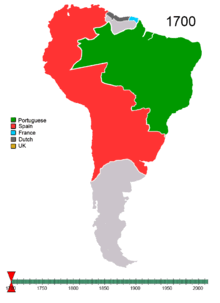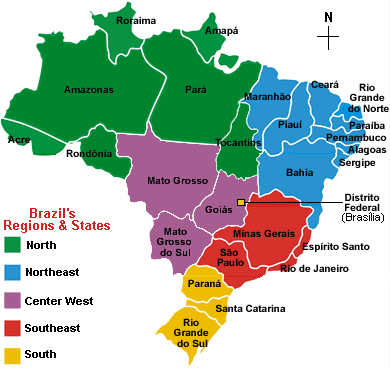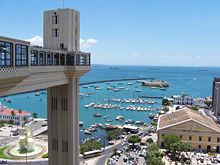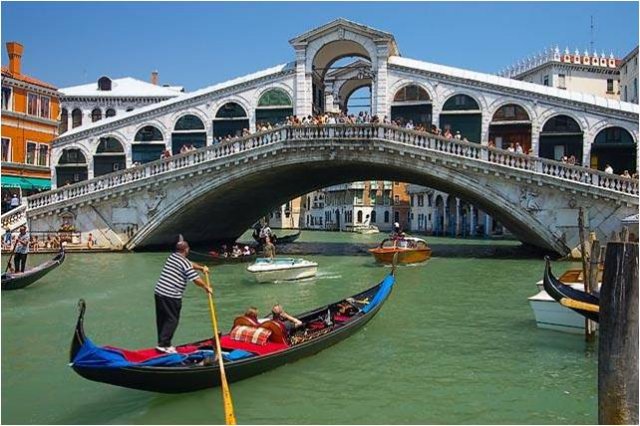 
 
 
 
 
 
 
 
 
|

Brazil (Portuguese: Brasil),
officially the Federative Republic of Brazil (Portuguese: República
Federativa
do Brasil, is the largest country in South America and the only Portuguese-speaking
country in
the Americas, It is both the world's fifth largest country by
geographical area
and by population.
Bounded by the Atlantic Ocean
on the east, Brazil has a coastline of over 7,491 kilometers (4,655
mi). It is
bordered on the north by Venezuela, Guyana, Suriname and the French
overseas
department of French Guiana; on the northwest by Colombia; on the west
by
Bolivia and Peru; on the southwest by Argentina and Paraguay and on the
south
by Uruguay. Numerous archipelagos are part of the Brazilian territory,
such as
Fernando de Noronha, Rocas Atoll, Saint Peter and Paul Rocks, and
Trindade and
Martim Vaz.
Brazil
was a colony of
Portugal from the landing of Pedro Álvares Cabral in 1500 until its
independence in 1822. Initially independent as the Brazilian Empire,
the
country has been a republic since 1889, although the bicameral
legislature, now
called Congress, dates back to 1824, when the first constitution was
ratified.
Its current Constitution defines Brazil as a Federal Republic. The
Federation
is formed by the union of the Federal District, the 26 States, and the
5,564
Municipalities.
Brazil is the world's eighth
largest economy by nominal GDP and the ninth largest by purchasing
power
parity. Economic reforms have given the country new international
recognition.
Brazil is a founding member of the United Nations, the G20, Mercosul
and the
Union of South American Nations, and is one of the BRIC Countries.
Brazil is
also home to a diversity of wildlife, natural environments, and
extensive
natural resources in a variety of protected habitats.
Portuguese
colonization and territorial expansion
The land now called Brazil
(the origin of whose name is disputed), was claimed by Portugal in
April 1500,
on the arrival of the Portuguese fleet commanded by Pedro Álvares
Cabral. The
Portuguese encountered stone age natives divided into several tribes,
most of
whom shared the same Tupi-Guarani linguistic family, and fought among
themselves.
Colonization was effectively
begun in 1534, when Dom João III divided the territory into twelve
hereditary
captaincies, but this arrangement proved problematic and in 1549 the
king
assigned a Governor-General to administer the entire colony. The
Portuguese assimilated
some of the native tribes while others were enslaved or exterminated in
long
wars or by European diseases to which they had no immunity. By the mid
16th
century, sugar had become Brazil's most important export and the
Portuguese
imported African slaves to cope with the increasing international
demand.
The
first Christian mass in
Brazil, 1500.Through wars against the French, the Portuguese slowly
expanded
their territory to the southeast, taking Rio de Janeiro in 1567, and to
the
northwest, taking São Luís in 1615. They sent military expeditions to
the
Amazon rainforest and conquered British and Dutch strongholds, founding
villages and forts from 1669. In 1680 they reached the far south and
founded
Sacramento on the bank of the Rio de la Plata, in the Eastern Strip
region
(present-day Uruguay).
At the end of the 17th
century, sugar exports started to decline but the discovery of gold by
explorers in the region that would later be called Minas Gerais
(General Mines)
around 1693, and in the following decades in current Mato Grosso and
Goiás,
saved the colony from imminent collapse. From all over Brazil, as well
as from
Portugal, thousands of immigrants came to the mines.
The
Spanish tried to prevent
Portuguese expansion into the territory that belonged to them according
to the
1494 Treaty of Tordesillas, and succeeded in conquering the Eastern
Strip in
1777. However, this was in vain as the Treaty of San Ildefonso, signed
in the
same year, confirmed Portuguese sovereignty over all lands proceeding
from its
territorial expansion, thus creating most of the current Brazilian
borders.

In
1808, the Portuguese royal
family, fleeing the troops of the French Emperor Napoleon I that were
invading
Portugal and most of Central Europe, established themselves in the city
of Rio
de Janeiro, which thus became the seat of the entire Portuguese Empire.
In 1815
Dom João VI, then regent on behalf of his incapacitated mother,
elevated Brazil
from colony to sovereign Kingdom united with Portugal. In 1809 the
Portuguese
invaded French Guiana (which was returned to France in 1817) and in
1816 the
Eastern Strip, subsequently renamed Cisplatina.
States and
municipalities
Brazil
is a federation
composed of twenty-six States, one federal district (which contains the
capital
city, Brasília) and municipalities. States have autonomous
administrations,
collect their own taxes and receive a share of taxes collected by the
Federal
government. They have a governor and a unicameral legislative body
elected
directly by their voters. They also have independent Courts of Law for
common
justice. Despite this, states have much less autonomy to create their
own laws
than in the United States. For example, criminal and civil laws can
only be
voted by the federal bicameral Congress and are uniform throughout the
country.

|







 |

